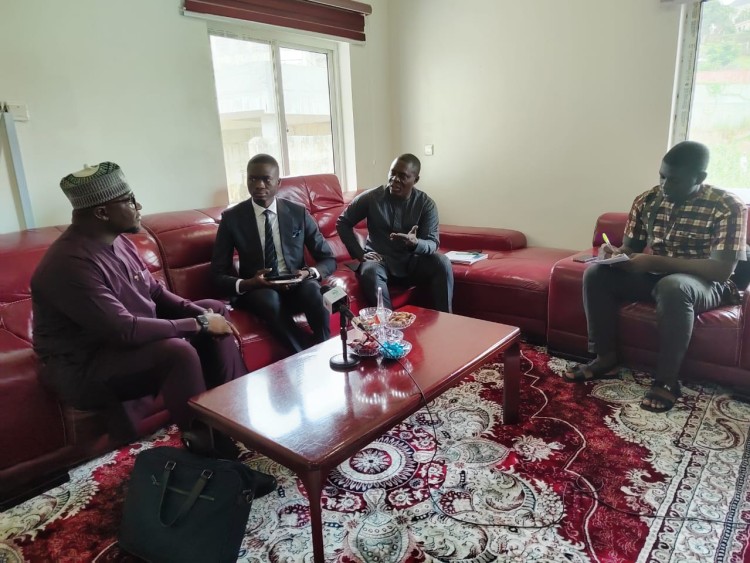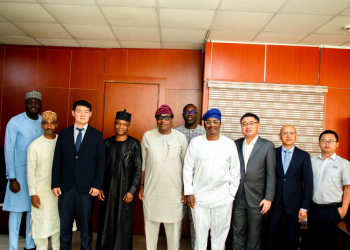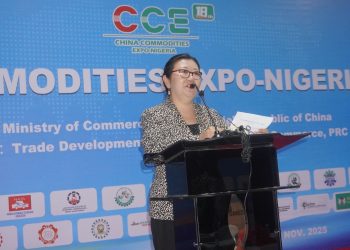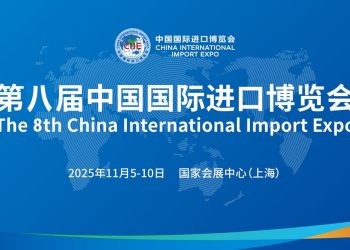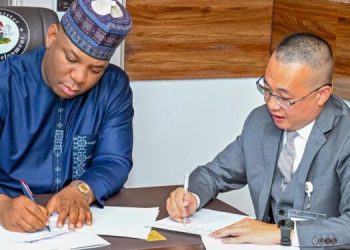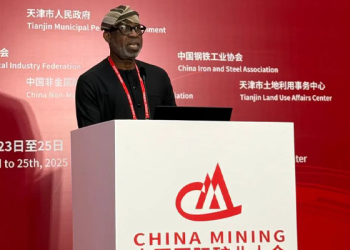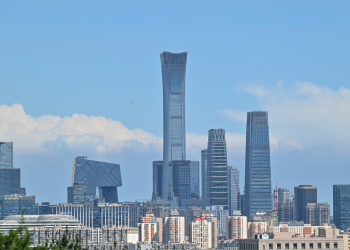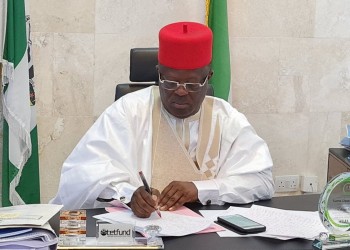In this exclusive interview, Usman Nasir Imam, Director Operations of Mutual Commitment Group (MCG) Limited spoke to our correspondent on the activities of the Chinese Construction giant in Nigeria and other sundry issues.
Q: May we meet you?
Usman: I am Usman Nasir Imam, Director of Operations, Mutual Commitment Group (MCG). MCG has lots of subsidiaries with the main one being Mutual Commitment Company (MCC). Incorporated in 2011 here in Nigeria with headquarters in Beijing, China.
Q: Can you run us through your operations and what your subsidiaries do?
Usman: We are a construction company that is into civil engineering construction in Turnkey projects ranging from power, roads, hospitals, buildings and other infrastructural projects.
Q: How many subsidiaries do you have and what do they do?
Usman: We have about six subsidiaries. They are also into civil engineering construction with some slight modifications.
Q: Can you run us through some of your most important projects in Nigeria within the last 13 years
Usman: we actively participated in the construction of the Omotosho power plant under the NIPP, the hospital project in Minna and extension of the Minna general hospital, Danja dam project in Katsina state for irrigation and agriculture and most recent the Nepza power plant in Kano and Calabar. A major project that is in the pipeline and key to the group is the 2000-bed capacity referral hospital that will be sited in the northeast to see to the humanitarian needs of the zone.
Q: Most of your projects are state government projects
Usman: Federal and state. Most importantly, the majority of our projects are based on contractor financing. We are among the few companies in the world that do contractor financing. Here we part-finance projects by providing a percentage of the funds needed for the project while the client provides the rest with a commitment to pay back after some time.
For example 30-70%. The counterpart of it will be 30% then we now fund the 70%. This model has given us an edge over our competitors. It’s a risk and we are open to that. We have used this model to assist Nigeria and other countries with limited resources for infrastructural projects.
Q: Apart from operating in Nigeria, which other country are you operating in globally?
Usman: We have been in Ghana, Niger, Mali and as far back 2019, Afghanistan.
Q: So how is the business environment in Nigeria?
Usman: Business is pretty much good. But we have experienced a few challenges recently. But our policy of contractor financing has helped in surmounting these challenges.
Q: Can you tell us any of your key projects in Nigeria where you applied the policy of contractor financing?
Usman: The Danja dam project in Katsina.
Q: What is the value of the project and what is the ratio of contractor financing applied?
Usman: Initial contract value is N7.8 billion but now reviewed to N16 billion. 30% from the state government and 70% from us. And this project started as far back as 2016 and it’s at the point of completion now.
Q: What is the capacity of the dam and how many people are expected to benefit from the project?
Usman: It is going to serve the entire Katsina South which is about 4 to 5 local governments. It will provide portable water, and irrigation facilities to irrigate 70 to 100 hectares of land bi-annually. We are also going to have a CSR in the area. There is an ancient part of the place we are working on which dates almost 500 years ago. The Gozaky village. We are going to transform that place into a resort. It is not just going to be a portable water and irrigation project, it is going to provide a tourist attraction. No place has the largest number of Baobab trees like that location. So we have looked at that. We have proposed to the state government. After the project, we are going to convert that village into a tourist resort.
Q: What is the contribution of your firm to the economic and infrastructural development of Nigeria?
Usman: Imeembsely. We have infrastructural projects across the country from roads, bridges, housing, and hospitals that we have completed and are ongoing as well.
Q: You are running projects in about 16 states of the federation. Cumulatively, what is the value of the projects?
Usman: It is about N500 billion or so. The most expensive of them is the N200bn bed capacity in the northeast.
Q: If you are making so much money in Nigeria, which other areas are you contributing to the community apart from the resort you talked about?
Usman: Each one of our projects has its own CSR and we try as much as we can to ensure that the local content part is included according to Nigerian laws. Our CSR is project-based. This implies they are sited within the location of our project. Ranging from the construction of hospitals, drilling of boreholes, construction and renovation of classrooms, provision of drugs and so on. It is based on needs assessment.
Q: How many Nigerians has your company given direct employment to?
Usman: Most of our personnel are project based meaning they are in different locations across the country. This is the head office and we have about 25 Nigerian staff working here at the headquarters. But Each of our projects nationwide has its personnel which runs in the hundreds.
Q: What are the opportunities for staff growth and development?
Usman: It’s a very critical point of concern to us. It will interest you to know that I came to this company with an NBA but I am currently running my PhD in this organization. Aside from some other certifications I have done with other colleagues. Secondly, we have in-house training twice a week to build the capacity of staff working here with us in Abuja. Thirdly, we have annual training for all our staff nationwide. So we are key to the human capital development of our staff.
Q: Is MCG a Nigerian company or a Chinese company?
Usman: Well I will say both. This is because the ratio between our Nigeria-China staff is equal. Wherever you see a Chinese, you see a Nigerian. Either you see the Chinese leading or the Nigerian leading.
Q: What are your plans and prospects for the future?
Usman: The future is very big and the plans are already on the way. We just don’t want to be seen as a China-Nigeria company. We want to be seen as a global company. Our projects are now cutting across Africa and some other parts of the world. Like this 2000-bed capacity hospital I spoke about, we are optimistic that the project will give MCG global prominence. The project is to be funded by the federal government under the ministry of Humanitarian Affairs, Disaster Management and Social Development while talks are in place with development partners such as the United Nations (UN), Africa Development Bank (AfDB) and the World Trade Organization (WTO) to part-fund the project. The N200bn project will be sited in a state in Nigeria’s North-East. The groundbreaking ceremony is expected to take place on the 1st of November, 2022 and we are co-financing the project as well.
Q: What qualifies MCG to handle this project?
Usman: MCG has a lot of experience in the construction of healthcare facilities in Turnkey. At the moment, apart from the construction of the Minna general hospital, we are constructing the Asaba hospital which is going to be upgraded to a teaching hospital with a 350-bed capacity. We have much experience in the design, construction and equipping of Turnkey hospitals not just in Nigeria but across the world.
Q: How will you describe the welfare of your Nigerian staff?
Usman: Yes. Before you leave, you can stop any of our Nigerian staff and ask how he or she feels about this company. There is a common word our GMD uses, that is ‘we are family and he sees us as a family. Whatever touches one, touches everyone and that feeling is there, not just in words but in action. We all celebrated the festival of Chinese two days ago. Not just by eating cake, cash gifts were also given to members of staff. The same thing applies to Christmas, new year or Sallah, it cuts across everyone. There are no festivities that will come without staff getting gifts from the company. There is harmony and cordiality.
Q: How will you describe trade relations between Nigeria and China?
Usman: We recently celebrated 50 years of bilateral relations between Nigeria and China and I received an award on that day as an ambassador of China-Nigeria friendship award. You know, we share a common date of Independence. That is on the first of October. First October is their national day and Nigeria’s independence day.
Q: It has been an interesting interview with you. Do you have anything else to add?
Usman: I want to say thank you for coming. Nigeria needs to learn a lot in terms of relations with other countries. We have a lot to learn from them in our day-to-day activities. Being with the Chinese, I have learnt a lot that has changed and improved my personal life. Because they have their way of life and by the time you blend it with yours, you are becoming a super person. You will have a discipline that is not commonly found in Nigeria. Not just with China, Nigeria needs collaborations, and partnerships with other nations of the world to achieve success in all our endeavours. China is a partner, Chinese people are partners and we are seeing the outcome of our relations with them.
[End]





























